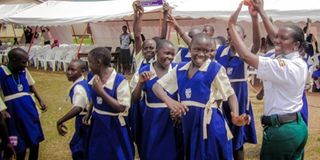Praised for her community service by Mark Zuckerberg

Agnes Igoye interacts with school children in one of the campaigns that seek to end child trafficking. PHOTO BY DOMINIC BUKENYA
What you need to know:
Agnes Igoye last week had a moment of glory when one of the world’s most influential people, Mark Zuckerberg, recognised her role in the fight against human trafficking.
On May 25, Facebook’s chief executive office, Mark Zuckerberg, returned to Harvard. He had returned to give a commencement speech 12 years after he dropped out of the prestigious university to start a social networking site.
In his speech, he encouraged graduates to create a purpose for their generation today. Among these graduates, was Agnes Igoye, a Ugandan, whom he lauded for training thousands of law enforcement officers to keep communities safe.
Igoye was graduating from Harvard Kennedy School as a Mason Fellow in the Mid-career Master in Public Administration, last week.
“Change starts local. Even global changes start small – with people like us,” Zuckerberg, who received an honorary degree after delivering his speech, said.
Others who received honorary degrees include actress Judi Dench, composer John Williams, and Somali human rights activist Hawa Abdi Dhiblawe.
Who is Agnes Igoye?
Igoye is the deputy coordinator of The National Prevention of Trafficking in Person’s Office and deputy chairperson of the National Anti-Human Trafficking Taskforce in the department of Immigration at the Ministry of Internal Affairs.
Igoye was still at Makerere University when she decided to get a deeper understanding of the trafficking world.
So, she applied to join the Ministry of Internal Affairs as an immigration officer when she was still a student. After graduating, she continued on with the Immigration Department, keen to contribute to the fight against human trafficking.
Together with her peers, Igoye has helped develop Uganda’s anti-trafficking efforts to meet international standards.
In 2013, she was instrumental in the arrest of one of the LRA commanders (who she would rather not disclose for security reasons) who allegedly was involved in abducting children.
She also rescued a number of girls that had been abducted to become wives for the rebels. Although her job is her passion, it is not without challenges, seeing as human traffickers are ready to kill for their cargo.
In an earlier interview with Daily Monitor, Igoye said; “It is humbling to listen to survivors’ tales. I’m lobbying Parliament to build a rehabilitation centre to help survivors revive their lost dreams. But I’m impatient. So, if they delay, I plan to build it with well-wishers.”
Lack of rehabilitation centres countrywide prompted her team to approach some NGO’s that now offer temporal housing for rescued victims of human trafficking. Personally, Igoye supports the victims with their education and highlights their plight at international fora.
This month, Igoye returns to Kampala with a cash reward of $50,000 (Shs180m) from The Diller-von Furstenberg Family Foundation to open the Dream Revival Centre to help survivors of trafficking reclaim their lives and pursue justice.
Background
Growing up in Pallisa District, Igoye claims she endured taunts from boys who called her a prostitute because she excelled in class. “When the meaning of that word was explained to me, I promised my mother that I would devote myself to making a difference in society,” she said. However, a few years later, LRA struck and to escape them, Igoye and her family had to move to an Internally Displaced People’s Camp.
In the camp, she came face to face with human trafficking because the minimally protected camp was a target for rebel recruitment.
Luckily, her parents – who were teachers – were transferred to Kampala, and Igoye joined Kitante Primary School and later Trinity College Nabbingo, before moving to Makerere University.
Igoye applied to the University of Minnesota for the Hubert Humphrey Fellowship in 2009 to study human trafficking policy and prevention. During her Fellowship, she trained with the FBI and the San Francisco Police Department.
Her other work
In 2011, Igoye was invited to the Clinton Global Initiative where she made a commitment of action with President Bill Clinton to rehabilitate trafficking victims, help children affected by war, and train 1,000 law enforcement officers. She has today trained more than 2,000 officers on how to identify suspected traffickers and victims.
Igoye started Chain of Hope rehabilitation Centre to provide shelter and education to survivors of the LRA and with support from Books for Africa, Sir Emeka Foundation, and well-wishers. She delivered 69,000 text books to vulnerable children.
She also started Huts of Peace, which has helped 22 homeless families in Gulu to find shelter and is a member of Sound Artists with Answers, a group of volunteers from South Sudan and Uganda, fundraising to support displaced South Sudanese.
Excerpts from Zuckerberg’s speech
We all get meaning from our communities. Whether our communities are houses or sports teams, churches or a cappella groups, they give us that sense we are part of something bigger, that we are not alone; they give us the strength to expand our horizons.
That is why it is so striking that for decades; membership in all kinds of groups has declined as much as one-quarter. That is a lot of people who now need to find purpose somewhere else.
But I know we can rebuild our communities and start new ones because many of you already are.
I met Agnes Igoye, who’s graduating today. Where are you, Agnes? She spent her childhood navigating conflict zones with human trafficking in Uganda, and now she trains thousands of law enforcement officers to keep communities safe.
Change starts local. Even global changes start small - with people like us. In our generation, the struggle of whether we connect more, whether we achieve our biggest opportunities, comes down to this - your ability to build communities and create a world where every single person has a sense of purpose. Class of 2017, you are graduating into a world that needs purpose. It’s up to you to create it.




